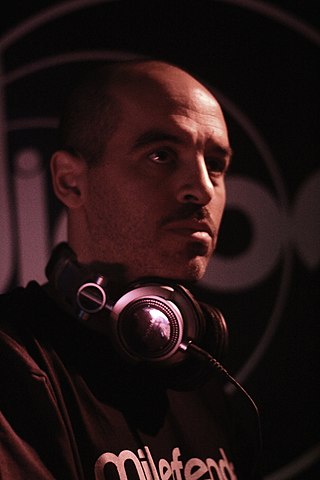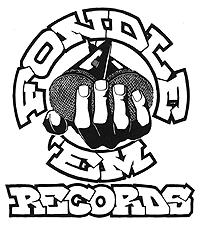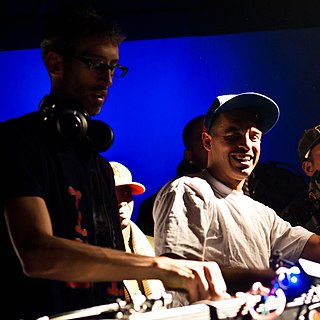Underground hip-hop (also commonly known as indie hip-hop or underground rap) is an umbrella term for hip hop music that is outside the general commercial canon. [1] It is typically associated with independent artists, signed to independent labels or no label at all. Underground hip hop is often characterized by socially conscious, positive, or anti-commercial lyrics. [2] However, there is no unifying or universal theme – AllMusic suggests that it "has no sonic signifiers". "The Underground" also refers to the community of musicians, fans and others that support non-commercial, or independent music. Music scenes with strong ties to underground hip hop include alternative hip hop and conscious hip hop. Many artists who are considered "underground" today were not always so, and may have previously broken the Billboard charts. [3]
Underground hip-hop encompasses several different styles of music. Numerous acts in the book How to Rap are described as being both underground and politically or socially aware, these include – B. Dolan [4] Brother Ali, [4] Diabolic, [5] Immortal Technique, [6] Jedi Mind Tricks, [7] Micranots, [8] Mr. Lif, [5] Murs, [5] Little Brother, [3] P.O.S [9] Zion I and Madlib, among others. [10]
Underground artists with critically acclaimed albums include Atmosphere, [4] Binary Star, [7] Blu, Cannibal Ox, [3] Company Flow, [11] Del the Funky Homosapien, [12] Roc Marciano, Danny Brown, Freestyle Fellowship, [7] Hieroglyphics, [13] Juggaknots, Jurassic 5, [11] Kool Keith, [6] Little Brother, [4] MF DOOM, [14] Non Phixion, [15] Planet Asia, [16] RJD2, [6] MC TP, [17] among many others. [10]
Additionally, many underground hip hop artists have been applauded for the artistic and poetic use of their lyrics, such as Aesop Rock, Aceyalone, [7] Busdriver, Cage, [16] CunninLynguists, [18] Dessa, OhSo Kew, [19] Doomtree, El-P, [5] Eyedea & Abilities, [5] Illogic, [14] Onry Ozzborn, MF DOOM, Rob Sonic, [12] billy woods, [20] and Sage Francis, [3] among others.
Some underground artists produce music that celebrates the fundamental elements or pillars of hip hop culture, such as Artifacts, Dilated Peoples, People Under the Stairs, and Fashawn whose music "recalls hip-hop's golden age". [6]
In Hip Hop's formative years, the vast majority of the genre was underground music, by definition. Although The Sugarhill Gang gained commercial success in 1979, most artists did not share such prominence until the mid-1980s. Ultramagnetic MCs debut album Critical Beatdown (1988) is seen as one of the earliest examples of "underground hip hop". [21] It was described that the album was characteristic of what would later be known as "Underground Hip Hop". New York underground rapper Kool Keith received notable success with his album Dr. Octagonecologyst , gaining more attention than any contemporary independent hip hop album "in quite a while". [22] The Stretch Armstrong and Bobbito Show was a notable underground hip hop radio show that was broadcast on WKCR, and later WQHT, in New York City from 1990 until 1999. [23] [24] It featured rappers such as The Notorious B.I.G., Big L, Jay-Z, and Eminem, as well as groups like Wu-Tang Clan, Mobb Deep, and Fugees, all before they gained any popularity. [25] In 1999, Prince Paul and Breeze Brewin' created one of the first rap opera albums, named A Prince Among Thieves. Rolling Stone gave the album a 4.5/5. [26]
In the late 1990s, progressive rap acts such as Black Star and Juggaknots helped inspire and shape the underground hip hop movement that would follow in subsequent decades. [27]

Keith Matthew Thornton, better known by his stage name Kool Keith, is an American rapper and record producer from The Bronx, New York City, known for his surreal, abstract and often profane or incomprehensible lyrics. Kool Keith has recorded prolifically both as a solo artist and in group collaborations. Kool Keith is generally considered to be one of hip-hop's most eccentric and unusual personalities.
East Coast hip hop is a regional subgenre of hip hop music that originated in New York City during the 1970s. Hip hop is recognized to have originated and evolved first in The Bronx, New York City.

Nathaniel Thomas Wilson, better known by his stage name Kool G Rap, is an American rapper. He began his career in the mid-1980s as one half of the group Kool G Rap & DJ Polo and as a member of the Juice Crew. He is widely considered to be one of the most influential and skilled MCs of all time, and a pioneer of mafioso rap/street/hardcore content and multisyllabic rhyming. On his album The Giancana Story, he stated that the "G" in his name stands for "Giancana", but on other occasions he has stated that it stands for "Genius".

Daniel Dumile, also known by his stage name MF Doom or simply Doom, was a British-American rapper and record producer. Noted for his intricate wordplay, signature metal mask, and "supervillain" stage persona, Dumile became a major figure of underground hip hop and alternative hip hop in the 2000s. After his death, Variety described him as one of the scene's "most celebrated, unpredictable and enigmatic figures".

Madvillainy is the only studio album by American hip hop duo Madvillain, consisting of British-American rapper MF Doom and American record producer Madlib. It was released on March 23, 2004, on Stones Throw Records.

The Cenobites LP is the eponymous debut album by the American hip hop duo the Cenobites, composed of rapper Kool Keith and producer Godfather Don. It was first released as an EP in 1995 via Fondle 'Em Records and was later expanded for LP in 1997 and CD in 2000. Percee P and Bobbito Garcia made guest appearances on the record.

Operation: Doomsday is the debut studio album by British-American rapper MF DOOM, released through Fondle 'Em Records on 19 October 1999 and reissued by Sub Verse Records in 2001 with a slightly altered track listing. It was his first solo release under the MF DOOM moniker after previously performing as Zev Love X in the group KMD. Operation: Doomsday is regarded as one of the most influential albums in independent hip-hop history. A deluxe remastered version of the album was released by DOOM's own Metal Face Records on 24 October 2011.

Vaudeville Villain is the third studio album by British-American rapper-producer MF Doom, released on September 16, 2003 under the pseudonym of Viktor Vaughn. All of the tracks are produced by Sound-Ink record label members Heat Sensor, King Honey, and Max Bill, with the exception of "Saliva", produced by RJD2.

Robert "Bobbito" Garcia, also known as DJ Cucumber Slice and Kool Bob Love, is an American DJ, radio host, author, and member of the Rock Steady Crew. He is known as a former co-host of hip hop radio show The Stretch Armstrong and Bobbito Show, alongside Adrian "Stretch Armstrong" Bartos, from 1990 until 1999. He later moved to Washington, D.C., where he currently hosts a new podcast on NPR called What's Good? alongside Bartos. Garcia was the announcer for the video game NBA Street Vol. 2.

Fondle 'Em Records was a hip hop record label founded and owned by Robert "Bobbito" Garcia from 1995 to 2001, based in New York, New York. Bobbito formed the label after realizing that the many unsigned rappers making guest appearances on The Stretch Armstrong and Bobbito Show, a program Bobbito co-hosted with DJ Stretch Armstrong on Columbia University radio station WKCR 89.9 FM, did not have a proper outlet for their talents.

Dr. Octagonecologyst is the debut solo studio album by American rapper and Ultramagnetic MCs member Kool Keith, released under the alias Dr. Octagon. Originally titled Dr. Octagon, it was released on May 7, 1996, on Bulk Recordings in the United States and Mo' Wax in the United Kingdom. The album was later reissued with a different track listing by DreamWorks Records in 1997 under the title Dr. Octagonecologyst. The album was produced by Dan "The Automator" Nakamura and featured the work of turntablist DJ Qbert. KutMasta Kurt provided additional production work. The artwork for Dr. Octagonecologyst was drawn by Brian "Pushead" Schroeder.
In rapping and poetry, multisyllabic rhymes are rhymes that contain two or more syllables An example is as follows:
I've got a bad taste / It gives me mad haste.
Sub Verse Music was a record label specializing in hip hop. It existed from 1998 to 2003 and released recordings by MF Doom, Blackalicious and KMD, among others.

Instrumentalyst (Octagon Beats) is a remix album by American emcee Keith Thornton, credited under the title Dr. Octagon. Released in 1996, it is the instrumental version of Dr. Octagonecologyst. It is Thornton's second album under the Dr. Octagon alias. Instrumentalyst (Octagon Beats) was produced by Dan "The Automator" Nakamura and featured the work of turntablist DJ Qbert. KutMasta Kurt provided additional production work. The artwork was drawn by Brian "Pushead" Schroeder.
Alternative hip hop is a subgenre of hip hop music that encompasses a wide range of styles that are not typically identified as mainstream. AllMusic defines it as comprising "hip hop groups that refuse to conform to any of the traditional stereotypes of rap, such as gangsta, bass, hardcore, and party rap. Instead, they blur genres drawing equally from funk and pop/rock, as well as jazz, soul, reggae, and even folk."

Rhymesayers Entertainment is an American independent hip-hop record label based in Minneapolis.
Progressive rap is a broad subgenre of hip hop music that aims to progress the genre thematically with socially transformative ideas and musically with stylistic experimentation. Developing through the works of innovative US hip hop acts during the 1980s and 1990s, it has also been known at various points as conscious, underground, and alternative hip hop.

Siddiq Booker aka Creature is a New York City-based independent underground rapper, vocalist, writer and composer who works in the rap, hip hop, and afro-punk genres.

The Stretch Armstrong and Bobbito Show was an underground hip hop radio show broadcast in New York, originally on 89.9 WKCR-FM, the student radio station at Columbia University, and later on 97.1 WQHT-FM. The show was hosted by Adrian Bartos and Robert "Bobbito" Garcia, and functioned as an alternative to commercial hip hop radio by airing unsigned artists, rarities and B-sides from commercial artists, and live freestyles and DJ scratch sessions. The show has been credited with introducing the world to Biggie Smalls, Eminem, Jay-Z, Big L, Big Pun, Fat Joe, Wu Tang Clan, Fugees and many other names which would rise to prominence in the mid to late 1990s.

Adrian Bartos known professionally as DJ Stretch Armstrong is a New York-based DJ and music producer, known as a former co-host of hip hop radio show The Stretch Armstrong and Bobbito Show, alongside Bobbito Garcia.